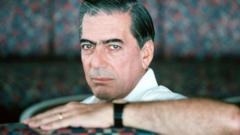The iconic author’s works, spanning over five decades, reflect his journey through political disillusionment and personal struggles, marking him as a central figure in the Latin American literary landscape.
**Mario Vargas Llosa: A Literary Titan of Latin America Passes Away at 89**

**Mario Vargas Llosa: A Literary Titan of Latin America Passes Away at 89**
Mario Vargas Llosa, noted for his bold literary contributions and political engagement, dies, leaving a legacy that shaped Latin American literature.
Mario Vargas Llosa, the renowned author and Nobel laureate, has died in his native Peru at the age of 89. Celebrated as one of the most influential voices in Latin American literature, Vargas Llosa was a prolific writer with over 50 works that continue to resonate across cultures. Awarded the Nobel Prize in Literature in 2010, he was lauded for his narrative prowess and acute observations on themes of authoritarianism, violence, and Latin American machismo.
Born in 1936 in Arequipa, Vargas Llosa’s early life was marred by family separation, leading him to be raised by his great-grandparents in Bolivia before returning to Peru. His literary journey began at age 16 with his first play, culminating in the publication of his debut novel, *The Time of the Hero* (1962). The novel critiqued the pervasive corruption within Peru's military schools and was met with backlash from the authorities, further cementing his image as a fearless commentator on socio-political issues.
Vargas Llosa became a key figure during the Latin American Boom of the 1960s and 70s, a movement noted for its innovative literary techniques and political engagement. His works, including *The Green House* (1966) and *Conversations in the Cathedral* (1969), provided critical insights into the socio-political upheavals unfolding in Latin America during this time.
His relationship with fellow author Gabriel García Márquez is particularly notable, marked by both collaboration and contention. Their infamous feud was sparked in 1976 but was ultimately resolved in 2007. Vargas Llosa's perspective on politics evolved significantly over his lifetime; once aligned with leftist ideologies, he later distanced himself from this stance, notably running for the Peruvian presidency in 1990 as a proponent of right-leaning policies.
Despite critiques, particularly concerning his investigation into the Uchuraccay massacre in the 1980s, Vargas Llosa produced works such as *The Feast of the Goat* (2000), which reframed narratives of state terror and personal resistance. His later works continued to exhibit his keen observations on power dynamics and individualism.
In recent years, Vargas Llosa was often in the spotlight for his personal life, including his high-profile relationship with Isabel Preysler after ending his 50-year marriage. He continued to draw attention with controversial statements, including his critique of feminism and remarks on the dangers journalists face in Mexico.
Vargas Llosa passed away on April 13, 2023, in Lima, leaving behind a profound legacy that resonates with the literary world and beyond, as the last of the giants of the Latin American Boom takes his place in history. His family expressed that he passed peacefully, surrounded by loved ones.






















